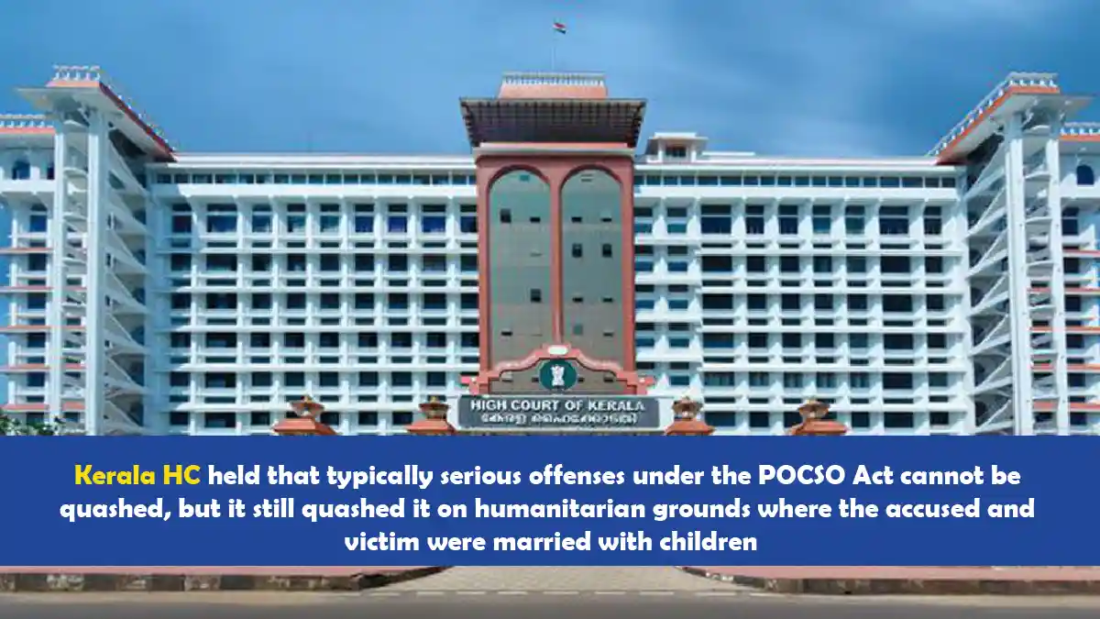Facts of the Case:
A Criminal Miscellaneous Case was filed under Section 482 of the Code of Criminal Procedure, 1973, to quash all further proceedings related to a FIR from Chengamanad Police Station, Ernakulam, pending before a Fast Track Special Court, Perumbavoor. The petitioners, accused in the case, faced charges under Sections 366, 342, 370, 370A, 376(2)(n) of the Indian Penal Code and Sections 5(l)(j)(ii) read with 6, 4 read with 3(a) of the Protection of Children from Sexual Offences Act (POCSO Act) against the 1st accused, and Section 21(1) of the POCSO Act against the 2nd accused. The allegations included the kidnapping and sexual assault of a 17-year-old victim by the 1st accused, and the 2nd accused’s failure to report the crime.
Contention of the Petitioner:
The petitioners argued that the matter had been settled, with the victim affirming the settlement through an affidavit stating she had married the 1st accused on August 25, 2021, and they are living happily with two children. They contended that, given the settlement and the family’s well-being, the proceedings should be quashed.
Contention of the Respondent:
The learned Public Prosecutor supported the settlement, noting that the 1st accused, and the victim are married and have children, and that they are living together happily. The Public Prosecutor also acknowledged that the settlement might render the continuation of criminal proceedings unnecessary.
Court’s Observation:
The court reviewed the applicability of Section 482 Cr.P.C. to quash criminal proceedings based on a settlement. It acknowledged that, generally, serious offences such as rape and POCSO Act violations cannot be settled and quashed due to their severe impact on society and their nature as crimes against the body and dignity of individuals. The court referenced several precedents, including Gian Singh v. State of Punjab and Another [(2012) 10 SCC 303]; Narinder Singh and Others v. State of Punjab and Another [(2014) 9 SCC 466]; Shimbhu v. State of Haryana [AIR 2014 SC 739]; State of Madhya Pradesh v. Madanlal [AIR 2015 SC 3003]; Parbatbhai Aahir @ Parbatbhai Bhimsinhbhai Karmur and Others v. State of Gujarat and Another [(2017) 9 SCC 641]; P.Dharmraj v. Shanmugam and others (Crl.Appeal Nos.1515-1516 of 2022) and many more where the Courts have emphasized that in serious offences involving moral turpitude or those that have a significant impact on society, such as rape, the High Court should be cautious in quashing proceedings based on a compromise. And reiterated the need to balance the rights of the victim with the broader public interest and societal impact.
The Kerala HC observed that “These are crimes against the body of a woman which is her own temple. These are offences which suffocate the breath of life and sully the reputation. And reputation, needless to emphasise, is the richest jewel one can conceive of in life. No one would allow it to be extinguished. When a human frame is defiled, the “purest treasure”, is lost. Dignity of a woman is a part of her non-perishable and immortal self, and no one should ever think of painting it in clay. There cannot be a compromise or settlement as it would be against her honour which matters the most.”
The Court stressed that a lenient approach can be a form of compulsion and diminish the victim’s dignity, such as permitting an accused person to marry the victim in order to end a case. It issued a warning, saying that permitting such settlements in cases involving significant offenses may convey the wrong message to the public and might incite repeat offenders to employ compulsion to settle disputes. However the Court observed that the parties in this instance were married and had two children living with them. HC stated that continuing the litigation will interfere with their family life, which is why the proceedings should be quashed for humanitarian reasons.
Therefore, after perusing all the precedents, the Kerala High Court concluded that despite the general rule against quashing serious offences like those under the POCSO Act, in this case, the circumstances justified a deviation from this principle. The 1st accused and the victim had married, established a family, and were living together with children. Therefore, quashing the proceedings was deemed appropriate to support the family’s stability and well-being.
Court’s Decision:
The court allowed the petition for quashing all further proceedings related to the said FIR and the Final Report, noting that the continuation of the trial was unnecessary due to the settlement and the family’s current status. All proceedings in this case were consequently quashed.
Written by Deeksha Rai
 Cart is empty
Cart is empty 

